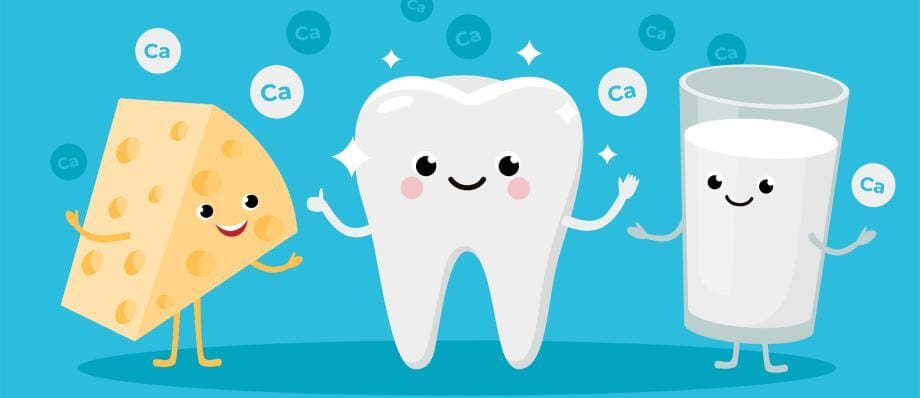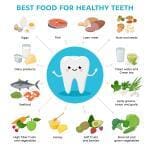Maintaining good oral health is crucial for overall well-being, and the role of various nutrients in this process cannot be underestimated. One such essential nutrient is calcium, renowned for its pivotal role in bone health. However, calcium’s impact extends far beyond bones – it plays a significant role in promoting oral health as well. In this comprehensive guide, we delve into the various aspects of calcium’s influence on oral health, its sources, recommended intake, and the consequences of deficiency.
The Importance of Calcium in Oral Health
Calcium is a mineral that is widely known for its crucial role in forming and maintaining strong bones and teeth. In fact, about 99% of the body’s calcium is stored in the bones and teeth, providing structural integrity and strength. But calcium’s significance in oral health goes beyond mere structure.
- Teeth Formation and Strength
- Enamel Protection
- Maintaining pH Balance
- Gum Health
- Tooth Sensitivity
Teeth Formation and Strength
Calcium is a fundamental building block in the development of teeth. During tooth formation, calcium is deposited in the enamel, the outermost layer of teeth, making them resistant to decay and damage.
Enamel Protection
Enamel is the first line of defense against acids and bacteria that cause tooth decay. Adequate calcium intake helps maintain the mineral content of enamel, making it more resistant to demineralization.
Maintaining pH Balance
Calcium-rich saliva helps maintain a neutral pH level in the mouth. This is crucial as an acidic environment can erode tooth enamel and promote the growth of harmful bacteria.
Gum Health
Calcium is essential for maintaining healthy gum tissues. Insufficient calcium intake may contribute to gum diseases like gingivitis and periodontitis.
Tooth Sensitivity
Proper calcium levels in the body can help reduce tooth sensitivity, as the mineral contributes to sealing off exposed dentin (the layer beneath the enamel) and reducing nerve sensitivity.
Sources of Calcium
Obtaining sufficient calcium is crucial for oral health. While dairy products are commonly associated with calcium, there are various sources suitable for different dietary preferences:
- Dairy
- Leafy Greens
- Nuts and Seeds
- Fortified Foods
- Fish with Edible Bones
- Supplements
Dairy
Milk, cheese, and yogurt are excellent sources of calcium. Opt for low-fat or non-fat options to minimize saturated fat intake.
Leafy Greens
Vegetables like kale, collard greens, and broccoli are rich sources of calcium. They are particularly valuable for individuals with lactose intolerance or vegans.
Nuts and Seeds
Almonds, chia seeds, and sesame seeds are calcium-rich snacks that can be easily incorporated into the diet.
Fortified Foods
Some foods, such as certain types of plant-based milk, orange juice, and cereals, are fortified with calcium. Check nutrition labels for information.
Fish with Edible Bones
Canned fish like salmon and sardines with soft, edible bones are not only rich in calcium but also provide vitamin D, which aids calcium absorption.
Supplements
In cases where dietary intake is insufficient, calcium supplements may be recommended. However, it’s important to consult a healthcare professional before starting any supplementation regimen.
Recommended Calcium Intake
The recommended daily intake of calcium varies depending on age, sex, and life stage. The following are general guidelines provided by the Institute of Medicine:
- Adults 19-50 years: 1000 mg per day for both men and women
- Men 51-70 years: 1000 mg per day
- Women 51-70 years: 1200 mg per day
- Adults 71 years and older: 1200 mg per day
Consequences of Calcium Deficiency
Insufficient calcium intake can lead to various oral health issues, such as:
- Tooth Decay
- Gum Disease
- Tooth Sensitivity
- Weakened Jawbone
- Delayed Tooth Development
Tooth Decay
Inadequate calcium weakens tooth enamel, making teeth more susceptible to cavities and decay.
Gum Disease
Low calcium levels can compromise gum health and contribute to gingivitis and periodontitis.
Tooth Sensitivity
Calcium deficiency may lead to exposed dentin and heightened tooth sensitivity.
Weakened Jawbone
Calcium deficiency can weaken the jawbone, potentially leading to tooth loss and changes in facial structure.
Delayed Tooth Development
In children, calcium deficiency during tooth development can result in weaker enamel and a higher risk of cavities.
Maintaining Optimal Oral Health Through Calcium Intake
Incorporating calcium-rich foods into your diet is essential for maintaining strong teeth and healthy gums. However, it’s equally important to consider factors that affect calcium absorption. Vitamin D, for example, plays a critical role in calcium absorption, so getting enough sunlight exposure or consuming vitamin D-rich foods is crucial.
Moreover, practicing good oral hygiene – including regular brushing, flossing, and dental check-ups – complements your efforts to maintain optimal oral health. Remember that a balanced diet, along with proper dental care, contributes to your overall well-being.
Supplementing Calcium Intake: Pros and Cons
While obtaining calcium from dietary sources is the preferred approach, some individuals may find it challenging to meet their recommended intake solely through food. In such cases, calcium supplements might be considered. However, it’s important to weigh the pros and cons before incorporating supplements into your routine.
Pros:
- Convenience
- Specific Needs
- Medical Conditions
Convenience
Supplements can provide a convenient way to ensure you’re meeting your daily calcium needs, especially if your diet falls short.
Specific Needs
Certain individuals, such as those with lactose intolerance or dietary restrictions, may find it difficult to obtain sufficient calcium from traditional sources. Supplements can bridge this gap.
Medical Conditions
Individuals with medical conditions that affect calcium absorption, like osteoporosis or certain gastrointestinal disorders, might benefit from calcium supplements as prescribed by a healthcare professional.
Cons:
- Absorption Issues
- Risk of Excess
- Interaction with Medications
Absorption Issues
The body may not absorb calcium supplements as efficiently as calcium from food sources. Factors like the type of supplement and whether it’s taken with food can impact absorption.
Risk of Excess
Excessive calcium intake, either from supplements or dietary sources, can lead to hypercalcemia, a condition characterized by high levels of calcium in the blood. This can have negative health effects, including kidney stones and impaired kidney function.
Interaction with Medications
Calcium supplements can interact with certain medications, such as those used for heart conditions and osteoporosis. It’s important to consult a healthcare professional before starting any new supplement regimen.
Balancing Calcium and Other Nutrients
While calcium is a cornerstone of oral health, it’s important to remember that a balanced diet includes a variety of nutrients that contribute to overall well-being. Vitamins, minerals, protein, and healthy fats all play roles in maintaining healthy teeth and gums. Strive for a diverse and nutritious diet that supports both oral health and overall wellness.
Conclusion
Calcium’s role in oral health is undeniable – from teeth formation and enamel protection to gum health and maintaining a balanced pH in the mouth. By incorporating calcium-rich foods into your diet, you contribute to the overall strength and well-being of your teeth and gums. Regular dental care and a nutritious diet, along with adequate calcium intake, are essential components of a comprehensive approach to oral health. If you have specific dietary concerns or health conditions, consult with a healthcare professional for personalized guidance on meeting your calcium needs and maintaining a healthy smile.





